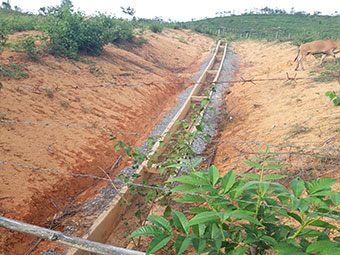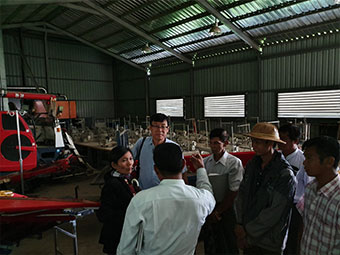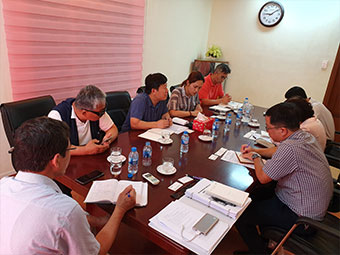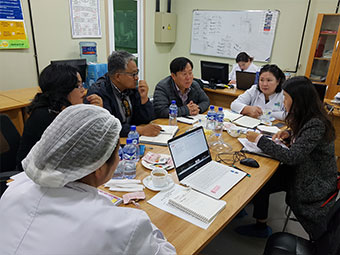
First Survey
First site survey was conducted from July 14 to 20 , 2019. KREI evalauation team consists of an evaluation director from Korea Rural Economic Institute, an environment and resource specialist, a researcher, and an external irrigation specialist from Korea Research Institute for Environment & Development. The team visited Laos, and had a meeting with the Ministry of Agriculture and Forestry(MAF), PM(Project Manager), beneficialries; and conducted a questionnaire survey and direct preservations of the irrigation dams and irrigation canals . Through interview, the assessment was conducted following the evaluation guidelines commonly used as the norm in the international community based on the five major criteria of OECD/DAC.


Second Survey
During the 2nd field survey form November 18 to 19, 2019, a workshop was conducted for sharing the evaluation results with the Ministry of Agriculture and Forestry. Discussions were made on ex-post management needed in the future and the follow-up projects.

TOTAL SCORE: 13.67/16(Sucessful)
Relevance: Upon looking into development strategies of Laos and the plans for agricultural and water resource development, the project was conducted following the policies and strategies on a national level, and is considered to conform highly with the national policies of Laos and carry strong legitimacy in implementation, taking into account that the project areas belong to the primary areas of agricultural irrigation development. The Tham and Hoy villages, the target areas of this project, are considered to have met the requirements. However, only dams, irrigation canals, and roads were constructed. Also, as the area's soil properties were not considered during the feasibility study, the actual project cost more than the planned budget, which stopped them from pursuing the programs for improving farm household income and agricultural development.
Efficiency: Due to the increase in the cost of hardware-related project factors, capacity-building projects such as dam maintenance and income increase activities could not be implemented. The project management system was three-pronged. It consisted of the Korea Rural Community Corporation (KRC), responsible for supervision, the Korea Engineering Consultants Corporation (KECC) which is the PMC, and the DOI which is the representative country of the recipient country. When unexpected problems such as delays and damage to irrigation canals occurred, they were resolved through cooperation between PMC and KRC by making project contents and budget adjustments.
Effectiveness: The construction of dams and irrigation facilities is expected to expand rice farming in the upstream region, increase crop production in the downstream area, and diversify the crops. The rice planting area of the upstream Tham Village has increased to 3-4 ha, while the downstream Hoi Village saw an increase in the cattle area and productivity. Vegetables like cabbage, Chinese cabbage, and carrots can grow in the land where only corn was planted before the project, leading to the diversification of crops.
Impact: Overall, residents believe that the establishment of irrigation facilities has had a positive impact on regional development by increasing crop productions across the region and market sales. While the residents in the Tham village near the reservoir did have positive views of the project, those in the Hoi village far from the reservoir had complaints about the insufficient supply of water. Also, some negative impacts were also witnessed with this product. The farm no. 7 was submerged due to this project, which is undermining the livelihoods of the residents there with the state government not compensating for the damage. Surveys showed that the dam's construction raised the income of farm households by around 20 to 25% on average, and there was no single household whose income declined. Also, it had the effects of increased employment in agricultural households, and reduced numbers of youths leaving for cities.
Sustainability: For the sustainability of the project, the local government has to secure capabilities to operate and maintain irrigation facilities on its own in terms of systems and personnel. However, the budget is insufficient. There is a difficulty in ex-post management due to the shortage of budget in the provincial government and district offices for the continued operation of the dam and irrigation facilities. The maintenance of the facilities and the plan for funding is unclear now. There is no follow-up project or program that the Laos government is conducting to raise the effectiveness of this project.
Cross-cutting Issue: Women have more jobs now because they are in charge of household chores in addition to the new workload. However, they are satisfied with the increased opportunity to earn more income. Also, Women's status and role in economic activities have been raised. In planning and implementing this project, Areas to be submerged were minimized by using the existing small-scale lake, taking into account the possible impact on the environment.
First Survey
From August 5 to 8, 2019, the KREI evaluation team visited the Ministry of Agriculture, Livestock and Irrigation (MOALI) and regional offices of MOALI in order to introduce the project evaluation and to ask for the cooperation regarding the field survey. Also, the evaluation team visited the project sites, East Paunggyi and Thanatpin in order to monitor the usage of the facilities and equipment provided in the project. In the meetings with villagers, the evaluation team conducted in-depth interview and collected opinions directly from the project participants.

Second Survey
From October 14 to 15, 2019, the KREI evaluation team visited Myanmar for the second time for the Scollection of the survey results and sharing the results with MOALI. In the meetings with the Myanmar government and consulting agents, the evaluation team could additionally collect opinions on potential follow-up activities and management for its sustainable operation. Also, they delivered additional comments of the villagers on ex-post management.


TOTAL SCORE: 10.8/16(Partly Successful)
This project was conducted in line with the national development strategy and Korea's country partnership strategy for Myanmar. All the activities for productivity increase for income growth and improvement of the environment were carried out as previously planned. 4 years after the end of the project, activities for the productivity increase are found no longer sustainable due to problems with local value chain and marketing. In contrast, all the activities for improvement of the environment are considered highly successful and satisfactory for villagers. Among the facilities including vinyl greenhouses, poultry farms, and fish farms in the project, only one poultry farm has remained in business. On the other hand, activities including building a village hall, installing drinking water facilities, road pavement, and electricity service facilities have brought about great impacts in the villages. Through the project, more than half of the households in the villages have, now, water through the pipes installed in this project. Particularily, Thanatpin Village did not have electricity before the project and now more than a hundred of households in the village have electricity at home. After the electricity installation, more than 40 families have been registered in moving-in. Despite the suspension of income-increasing project, projects for the improvement of environment can be operated sustainably from a long-term perspective. In order for them to be sustainably operated, there should be ex-post management plans. Particularly, villages asked for the spare parts of the machinery and training for machinery repairs. Also, drinking water facilities, which was highly satisfactory for the villagers, can be additionally provided as a ex-post management. It costs only 0.7 percent of the total project budget.
First Survey
From July 2 to 5, 2019, KREI team accompanied by Dr. Yongil Cho from Sunchon National University visited Vietnam for the 1st field survey. During their visit, the team had a meeting with the Ministry of Agriculture and Rural Development(MARD), National Centre for Veterinary Diagnosis(NCVD), and Regional Animal Health Offices(RAHOs); and conducted in-depth interview for the project evaluation. In addition to this, the team designated the local consultant for the on-site supports and facilitation, and discuss further survey process.
After the project, the NCVD become financially independent from 2019 due to the increased fee margin of animal disease diagnosis. Especially, most of interviewee empathized that this project enabled the NCVD to successfully respond to the African Swine Fever(ASF) outbreak and spread in early 2019.

Second Survey
From August 26 to 30, 2019, KREI team visited Vietnam for the 2nd field survey and evaluation result-sharing workshop. The workshop was held on the 28th to share the final result of project evaluation and identify the additional needs for follow-up project and post-project management. From the Vietnamese side, the needs for advanced lab facilities (Biosafety Level 3) were assessed to respond efficiently to recent transboundary and emerging animal diseases.
In addition, the team conducted a field survey to collect additional data and had a meeting with the local consultant to wrap up the local survey process including questionnaire survey, interviews and on-site investigation.

TOTAL SCORE: 13/16(Highly Successful)
This project is in line with Vietnam's national development strategies and Sustainable Development Goals(2-a). Although the project was suspended in 2016 due to Vietnam's issues, the overall project process was carried out smoothly in general. Especially, the overall capacity of the NCVD, as the national control tower of animal disease in Vietnam, has improved significantly.
The number of diagnoses at NCVD has increased by 270% after the project(2019) compared to before the project(2013) and the animal diseases that have become diagnosable have also increased. In addition to this, according to meetings with NCVD, the entire process from sample registration to final diagnosis which required at least half a day is now possible in 3 to 4 hours, which means that the results can be notified on the same day of registration. Also, from 2019, the NCVD kept its financial independency with significant growth of income level. The questionnaire survey results were also positive; the focused group shows their satisfaction to the capacity improvement and efficient working process of the NCVD.
On the other hand, some of the equipment like Autoclave is currently not in use since there is no BL3 lab and the newly constructed building is barely being used, which indicates inefficient project planning process. But considering that Vietnam and its neighboring countries experiencing difficulties with operating BL3 facilities due to high operating cost and/or lack of operational capabilities, it wouldn't be feasible to support BL3 lab facilities as the following project. Rather than providing the unused infrastructures, if would be more effective to provide mid-to-long term consultations about lab placements, equipment installations, and joint research opportunities for the long-term sustainability.
First Survey
On the first survey as preliminary research, KREI visited the R&D center and had discussion about the processing factory operation and business effects.

First Survey
KREI visited kindergarten and bakery company purchasing the dairy products and processed food ingredients from this factory, and surveyed on the usage, quality and consumer satisfaction of the products. Also, in-depth interview was conducted on beneficiaries of this project.

TOTAL SCORE: 14.3/16(Highly Sucessful)
The evaluation shows that livestock processing, sanitation control system and human ability improvement are matched with the national development strategy, national food security plan and national livestock policy of Mongolia. Also, it was closely related to the item of Approach to Safe, Nutritive and Sufficient Food in SDGs 2-1, and the training through the livestock sanitation control system is related to the Approach to Third Education like Technical Training, College Education and Vocational Training. The project promotion committee was organized for this project, they monitored the whole process for risk control. The outcome has been achieved efficiently in comparison with the planned workforce, budget and project period. Because of close cooperation between the PM of Korea and the institute of Mongolia, the whole process has been done efficiently, this project needed no more budget or time. However, maintenance of the facilities and equipment supplied from Korea was done well, but some equipment had a part in the failure. When Korean equipment had trouble, there was a problem to replace with parts made in Korea, and if they are replaced with parts made in Mongolia, there was a voltage problem causing power trouble frequently. Livestock processing facilities were established in school, students could get benefits from both of theoretical and practical education. With the improved students’ knowledge, more students could get a job, and satisfaction level of the employing companies was very high. Professors and graduate students could also improve their performance of research by using the ingredient analysis room and test equipment supplied from Korea.
Especially, five kinds of processed dairy and meat products have been developed since 2017, and the developed products have got patented and are being produced in the factory. Also this factory has been selected as an official analysis center authorized by the government, and analyzes the quality of processed foods. In addition, people from diverse institutes visit this factory having hygienic control system to get education about the hygienic system. They are from the government offices, colleges, food associations, companies, vocational schools, kindergartens, and so on. After the project ended in 2015, this processing factory was operated mainly as an education and practice facility, but the secondary dairy and meat processing factory was established with ADB support fund in 2017, and this has been selling own products since the end of 2017. This project is closed related to the national policy of Mongolia, the suitability and efficiency of the project is highly evaluated. Moreover, its public function of education and its business function of profit making show definite outcomes due to systematic management and operation of the project operator in Mongolia. Therefore, KREI evaluates this project is effective, influential and sustainable.
First Survey
Date of visit: 22 - 27 July, 2018
Venue of visit: Ministry of Agriculture and Rural Development, Vietnam Academy of Agricultural Sciences, Field Crops Research Institute, Hai Duong People's Committee, Hoa Binh People's Committee
Purpose of the field visit: To interview beneficiaries, contract farming groups, and stakeholders such as government officers involved in the design and implementation of the project

First Survey2
Date of visit: 12 - 15 November, 2018
Venue of visit: Ministry of Agriculture and Rural Development, Orion Food Vina, Field Crops Research Institute, National Institute of Agricultural Planning and Projection
Purpose of the field visit: To share the results of the questionnaire survey for evaluation

TOTAL SCORE: 10.8/16(Partly Successful)
(Relevance) The project’s target to secure sales networks through contract-based farming complied with the first economic goal of Vietnam’s restructuring policy aiming at market-oriented agriculture and was also in line with the Millenium Development Goals (MDGs). (Efficiency) The project achieved all the outcomes in time, such as the formation of demonstration farms, training sessions for Vietnamese officials in Korea, the provision of farming equipment, Korean experts’ on-site consultation for Vietnamese farmers, and contract-based farming. (Effectiveness) The project provided demonstration farms, greenhouses for seedling beds, warehouses, water pumps, and machines. According to the survey at the time of project completion, 40 to 50% of farmers saw income increase, implying that the project achieved its short-term target. (Impact) The project provided various lectures for farming technology transmission. Although the training and capability development opportunities can lead to income increase, it is hard to measure the impact quantitatively. (Sustainability) The experience of contract-based farming positively influenced farmers. Contract-based farming will resume with increases in farming areas and produced yields if potato seeds are provided based on expected demands for potatoes.
First Survey
August, 6th ~ 11st, 2018

Second Survey
October 29th ~ November 1st, 2018
TOTAL SCORE: 15.3/16 (Highly Successful)
- Relevance: 4/5,
- Effectiveness/Impact: 3.6/5
- Sustainability: 3.7/5
The overall score of this project was 15.3 (16 points out of 10) and could be evaluated as a very successful project (appropriateness: 4 points, efficiency: 4 points, effectiveness / impact: 3.6 points, sustained) Possibility: 3.7 points). First, concerning the relevance of the project, the establishment of a forest research facility and the reforestation of a wasteland is consistent with the development goals of the forestry sector of Cambodia's boxing strategy and national development strategy, and are consistent with Korea's National Partnership Strategy (CPS). It can be seen that.
Second, it was found that the construction of the forest research center planned for the initial stage of the project, restoration and reforestation of wasteland, dispatch of experts, and support for equipment were all successful within the project period.
Third, it was evaluated that all components, such as the Forest Research Center, equipment support, and forest reforestation, were successfully constructed and useful in terms of the current operation, management, and utilization. In particular, in the case of the creation of a restored forest in Siem Reap aimed at improving the forest environment, the tree planting rate and tree planting rate were very high. It also had a significant impact on raising awareness of the forest environment of nearby residents.
Fourth, this project was able to raise awareness about the conservation and improvement of the forest environment of residents. It ould be evaluated that it has a great influence in consideration of the economic income generation even after the process colpletion of the project. However, although the equipment and facilities used to create the forest research base are being used sufficiently, it was found that they were partially insufficient in terms of improving human capacity and spreading research technology.
Fifth, concerning the sustainability of the project, it was confirmed that the forest research center, nursery, etc., which can represent the establishment of the forest research base, were very well operated and managed. Cambodia's own operational capability and institutional stability were sufficiently secured.
However, currently, Phnom Penh's Forest Research Center does not plan to secure sufficient experimental equipment, facilities, and workforce. In Siem Reap's recovery forest, there is a lack of budget despite the need for equipment and workforce to increase the number of plants and prepare for forest fires.